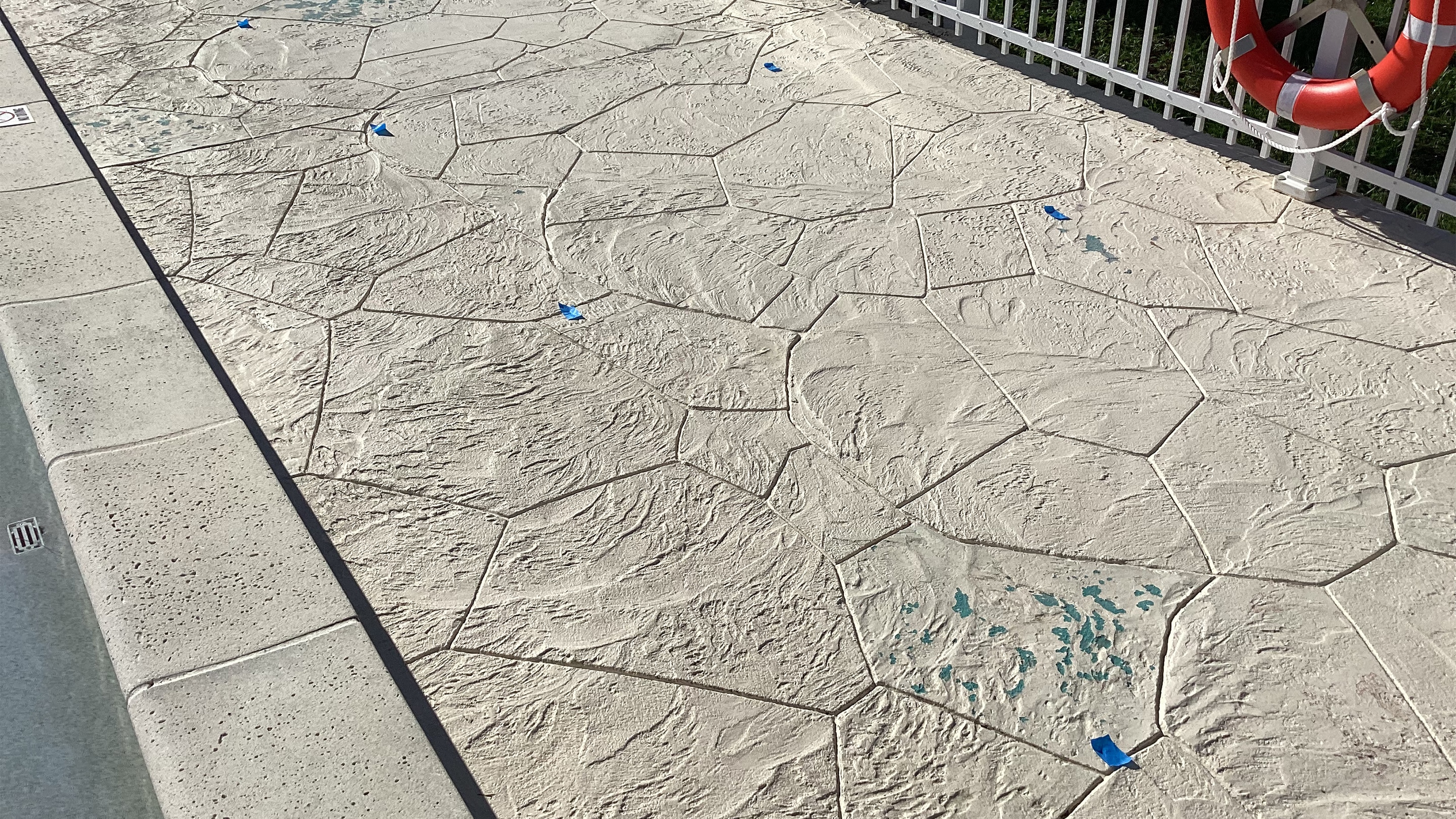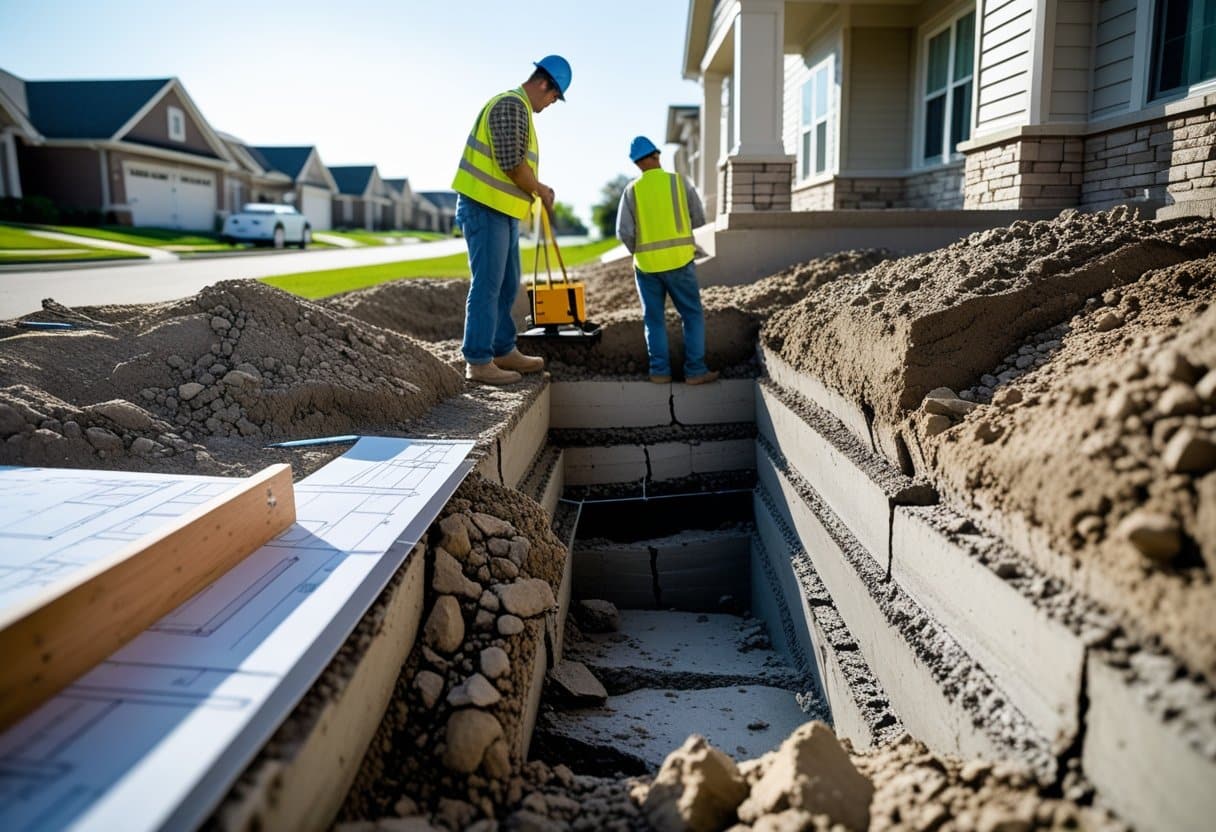Sinkholes are more than just surface-level problems, they can silently weaken the ground beneath your property, leading to serious structural damage. So, how do you stop a sinkhole from growing before it causes costly repairs?
One proven solution is compaction grouting, a technique that strengthens the soil from the inside out. This method involves injecting thick grout under pressure to stabilize weak or loose soil. It doesn’t just fill the gaps, it compacts and reinforces the area to restore the ground’s ability to support your home or structure.
With over 20 years of experience in Florida, Helicon specializes in advanced sinkhole repair, including compaction grouting, to help you protect your property and reclaim peace of mind.
In this blog, we will talk about:
- What compaction grouting is and how it solves sinkhole problems
- Why Florida soil conditions make this method so effective
- How Helicon uses precision techniques to deliver safe, lasting results
Let’s break it down!
What Is Compaction Grouting?
Compaction grouting strengthens weak soil and fills voids beneath foundations.
Technicians inject grout to push and compact loose soil, stopping sinkholes and stabilizing the ground around your property. This process uses special grout materials that harden underground, creating a solid base that supports structures and prevents further settling or cracking.
Definition and Process Overview
Technicians pump a thick grout mix into the soil through small pipes. They inject the grout in stages, pushing aside loose soil and filling empty spaces underground.
Each stage adds pressure that compacts the soil around the grout, increasing its density and strength. This is crucial when dealing with sinkholes, as it stops soil from collapsing and causing damage.
Crews use precision tools to control where and how they place grout. This keeps your home or building stable without disturbing the surface too much.
Key Principles Behind Compaction Grouting
The main idea is simple: push grout into weak soil to make it denser and stronger. This involves three key principles:
- Displacement: Grout pushes soil particles closer together.
- Filling Voids: It fills holes and gaps where soil is missing or loose.
- Increasing Load-Bearing Capacity: Soil can then better support the weight of your foundation.
By following these principles, compaction grouting prevents sinkholes from growing and keeps foundations from sinking or cracking.
Types of Grouting Materials Used
Different grout mixes suit different jobs. For compaction grouting, the grout is usually a stiff, low-slump mortar that can hold shape under pressure.
Common materials include:
- Cement-based Grouts: Strong and durable, they harden tightly around soil particles.
- Polyurethane Grouts: Flexible and expanding, these fill cracks and adjust with soil movement.
The right grout choice depends on soil conditions and the extent of damage. Companies like Helicon select the proper grout for long-lasting sinkhole repair and soil stabilization in Florida’s tricky ground conditions. For more details about grouting and repair, you can visit Helicon’s page on pool repair grout concrete bonder.
Understanding Sinkholes
Sinkholes can cause serious damage to your property if not caught early. Knowing what causes them and the signs to watch for helps you protect your home and avoid costly repairs.
Common Causes of Sinkholes
Sinkholes usually form when the ground beneath your property weakens, collapses, or erodes. In Florida, these events are more frequent due to naturally soft, porous soils. Understanding the root causes helps you spot potential risks before they become serious.
Here are the most common causes of sinkholes:
- Natural Erosion from Rainwater: Over time, rainwater seeps into the ground and dissolves limestone or other soft rock, leaving behind empty underground cavities that eventually collapse.
- Human Activities: Drilling, excavation, or construction work can disturb soil layers and accelerate erosion. Even something as small as a leaking underground pipe can trigger instability.
- Poor Drainage Systems: When water can’t flow away properly, it saturates the soil, weakening its structure and increasing the risk of collapse.
- Fluctuating Water Tables: Rapid changes in underground water levels, due to drought, heavy rainfall, or pumping, can wash away supporting soil layers and trigger sudden sinkhole formation.
Knowing these causes helps you understand which areas are more vulnerable and when to call in the experts.
Signs and Impact of Sinkholes on Property
Sinkholes often start with small signs—and the sooner you catch them, the better you can protect your property. Ignoring early red flags may lead to foundation damage, structural issues, and costly repairs.
Watch for these common signs that a sinkhole may be forming:
- Visible Cracks: Look for cracks in walls, floors, foundations, driveways, or outdoor slabs that weren’t there before or are suddenly growing larger.
- Sticky Doors and Windows: If doors start sticking or windows won’t close smoothly, it could mean your structure is shifting due to unstable soil underneath.
- Uneven Ground or Depressions: Sagging, sloped, or sinking areas in your yard or driveway could indicate a void forming beneath the surface.
- Sudden Holes or Openings: If you spot a sudden dip or open cavity in the ground, don’t ignore it; this is a strong indicator of a sinkhole starting to open up.
The impact of sinkholes can go far beyond cosmetic damage. They may affect everything from your pool deck to your home’s foundation, and lower your property’s value in the process.
If you notice any of these signs, it’s time to bring in the pros. Helicon specializes in fast, safe, and long-lasting sinkhole repair using techniques like compaction grouting to stabilize the soil and restore confidence in your property’s safety.
How Compaction Grouting Addresses Sinkholes?
Compaction grouting works by injecting thick grout into the ground to fix weak soil and empty spaces. This process strengthens the soil, stops sinking, and prevents more damage. It is a reliable way to stabilize areas affected by sinkholes without major excavation or disturbance.
Stabilizing Soil and Void Spaces
When you have a sinkhole, the soil underneath your home or driveway is often loose or has hidden gaps.
Compaction grouting fills these voids with a dense mixture of cement and sand. This grout plugs empty spaces and packs the soil tightly around it, resulting in a firmer base that supports structures above.
This method is especially useful in Florida, where soil conditions can be unstable. By solidifying weak spots underground, compaction grouting keeps your foundation from shifting or sinking further.
Mitigating Further Ground Movement
Compaction grouting also helps reduce the chance of future ground movement.
Once crews inject the grout, it acts like a solid pillar beneath the surface. This support distributes weight more evenly and resists pressure that could cause new sinkholes.
If you live in an area prone to sinkhole activity, this method provides long-term protection. It limits soil collapse by reinforcing spots that might otherwise weaken over time.
Advantages Over Alternative Methods
Compared to digging out and replacing soil or using chemical-only grouts, compaction grouting offers several benefits:
- Less disruption: The process requires only small holes to inject grout, avoiding heavy excavation.
- Faster repairs: You get results quickly without tearing up large areas.
- Strong results: The compacted soil holds up well under weight and weather changes.
- Cost-effective: It targets problem areas without large-scale soil removal.
Helicon uses this technique to tackle sinkholes safely and effectively.
Comparing Sinkhole Repair Methods: What Works Best and When
Not all sinkholes are the same, and that’s why no single repair method fits every property. From soil type to sinkhole depth, the best solution depends on your specific conditions. Helicon doesn’t apply a one-size-fits-all fix. Instead, they evaluate each site to recommend the safest and most cost-effective approach.
Here’s a simple breakdown of common sinkhole repair techniques and when each method is typically used:
| Repair Method | Best Used When | Key Advantages |
| Compaction Grouting | Loose soil, moderate voids, minimal surface disruption desired | Densifies soil, fills voids, fast with low impact |
| Chemical Grouting | Minor voids, water intrusion, or crack sealing needed | Flexible, water-resistant, fills small cracks or gaps |
| Underpinning (Piers) | Severe structural damage or deep sinkholes near foundation | Provides direct support to structure, long-term stabilization |
| Excavation and Rebuild | Large collapse areas or irreparable voids | Removes all compromised soil, allows for rebuild from scratch |
| Combination Methods | Complex or layered sinkhole activity | Custom mix of grouting + piers or drainage for complete repair |
Each method has a purpose, and our experts help you understand which approach protects your home, budget, and peace of mind the best.
Compaction Grouting Procedure for Sinkholes
Compaction grouting for sinkholes involves careful preparation, precise injection, and ongoing checks to ensure your ground becomes stable and safe. Each step helps control where grout goes and how well it fills underground voids.
Site Assessment and Planning
Before starting, a detailed site assessment using ground radar and soil tests maps the sinkhole’s size, depth, and soil type. The assessment identifies exactly where weak spots or cavities are to properly target grout injections.
Planning also involves deciding where to drill injection points. These points are spaced based on soil conditions and the sinkhole’s extent. The plan must limit disturbance to your property while maximizing grout effectiveness.
During this phase, our experts focus on safety and long-term results, tailoring the plan to your site’s unique needs.
Drilling and Injection Techniques
Crews drill small-diameter holes into the weakened soil beneath the sinkhole. They pump grout—a thick, low-mobility mix—under pressure through these holes. The grout pushes the surrounding soil outward and fills voids.
Injection happens in stages. The grout is injected, then the pipe advances deeper to repeat the process. This builds compacted soil columns below. The goal is to increase soil density and fill empty spaces, stopping the sinkhole from growing.
Precise control over pressure and grout volume is critical. Too much pressure can damage nearby structures, while too little won’t stabilize the soil well. Skilled technicians adjust these settings on-site for the best result.
Monitoring and Quality Control Measures
Technicians track grout volumes, pressures, and injection rates in real time. These numbers show how the soil responds and if the voids are filling properly.
In addition to equipment data, frequent visual inspections and site checks ensure the safety of your property. Sensors or mark points may be used to detect any ground movement during and after the work.
Helicon relies on strong quality control to deliver lasting solutions.
Selecting a Compaction Grouting Contractor
Choosing the right contractor means looking for proven experience and asking questions that reveal true expertise. Knowing what skills and services to expect helps avoid delays and extra costs. Focus on contractors with a solid track record, proper equipment, and clear communication.
Essential Qualifications to Look For
Find a contractor with real experience in compaction grouting, especially for sinkhole repair in your area. They should use reliable materials and modern equipment to ensure long-lasting results. Licenses and insurance protect you from risks during work.
Check if the company has completed projects similar to yours. A contractor like Helicon, trusted since 2004, offers clear proof of skill in Florida’s soil and foundation challenges. Look for certifications related to foundation repair and soil stabilization. These show they follow industry standards and safety rules.
Questions to Ask Before Hiring
Not all contractors offer the same level of expertise, transparency, or follow-through. Asking the right questions up front can prevent surprises later and help ensure you’re working with a team that prioritizes quality, safety, and communication.
Here are key questions to ask when hiring a compaction grouting contractor:
- What’s your process for site evaluation?: A reliable contractor should walk you through how they assess soil conditions, locate voids, and determine where grout needs to be injected.
- How do you handle unexpected issues underground?: Ask how they respond to surprises like larger-than-expected voids or shifting soil. Will they adjust the plan without hidden costs or delays?
- Do you provide warranties or guarantees?: Clear warranties show confidence in the work and give you peace of mind that the repair will hold up over time.
- How do you communicate during the project?: Consistent updates reduce stress and help you stay in the loop. A good contractor will keep you informed from start to finish.
Asking these questions helps you choose a contractor, like Helicon, who understands Florida soil and values transparency, safety, and long-term results.
Wrapping It Up
Sinkholes can start small but lead to big problems if left untreated.
Whether it’s a sagging driveway, shifting soil, or warning cracks around your home, addressing the issue early with compaction grouting can make all the difference. This method strengthens the ground from within—protecting your foundation, your investment, and your peace of mind.
Helicon has been Florida’s trusted expert in sinkhole repair for over 20 years, using precise compaction grouting techniques to deliver safe, long-lasting results.
If you’re seeing signs of ground instability or want a professional opinion, schedule your free inspection today. Our team will assess your property, explain your options clearly, and guide you toward a stable, secure foundation.
Frequently Asked Questions
Sinkholes aren’t something you can ignore, and choosing the right repair method can feel overwhelming. You may have many questions, so let’s break things down. Here are some of the most searched and relevant questions about compaction grouting, answered simply and clearly.
How do you perform compaction grouting to stabilize ground?
Technicians inject a thick grout mixture into the soil through a drill hole. As the grout is pumped in, it pushes loose soil aside and solidifies, which increases the ground’s density and strength. This technique helps fill voids and stabilize weak areas, like those caused by sinkholes.
What factors influence the cost of compaction grouting?
Costs vary based on the size and depth of the affected area. Soil type, accessibility, and the amount of grout needed also play a role. Emergency repairs or complex projects near structures will raise the price. Local companies like Helicon provide estimates after site evaluation.
What are the pros and cons of using compaction grouting for ground stabilization?
The pros include quick soil strengthening, minimal surface disruption, and long-lasting results. It is effective for small to medium voids and can prevent further sinking. On the downside, it may not be the best choice for very large sinkholes, and the process requires skilled operators to manage grout injection pressure.
Can compaction grouting be used for large scale sinkhole remediation?
While compaction grouting can stabilize moderately sized sinkholes, very large or deep sinkholes may need additional techniques or a combination of methods. Sometimes, structural supports or chemical grouting are used together with compaction grout to fully repair the area.
How does compaction grouting compare to other sinkhole repair methods?
Compared to chemical grouting, compaction grouting physically shifts and densifies soil, while chemical grouting fills voids with liquid chemicals that harden. Vibro compaction deals with soil stabilization before construction but may not fix existing sinkholes. Compaction grouting is often faster and less invasive than full excavation.
What should you consider when choosing a contractor for compaction grouting?
Look for experience with local soil conditions and success in sinkhole repair. A good contractor will give you a clear project plan, explain the materials, and offer warranties. Helicon, for example, has years of experience in Florida and focuses on safety, transparency, and customer care.





